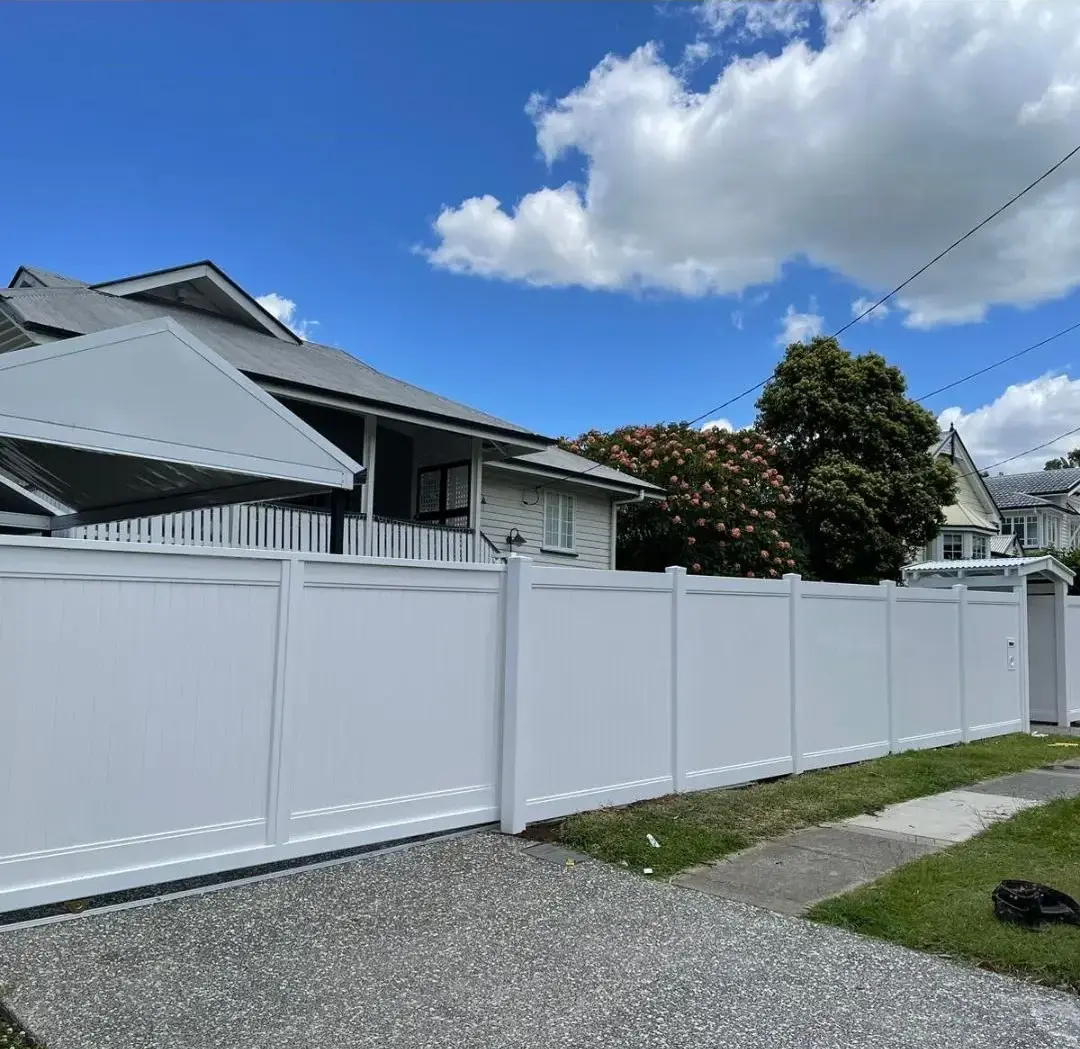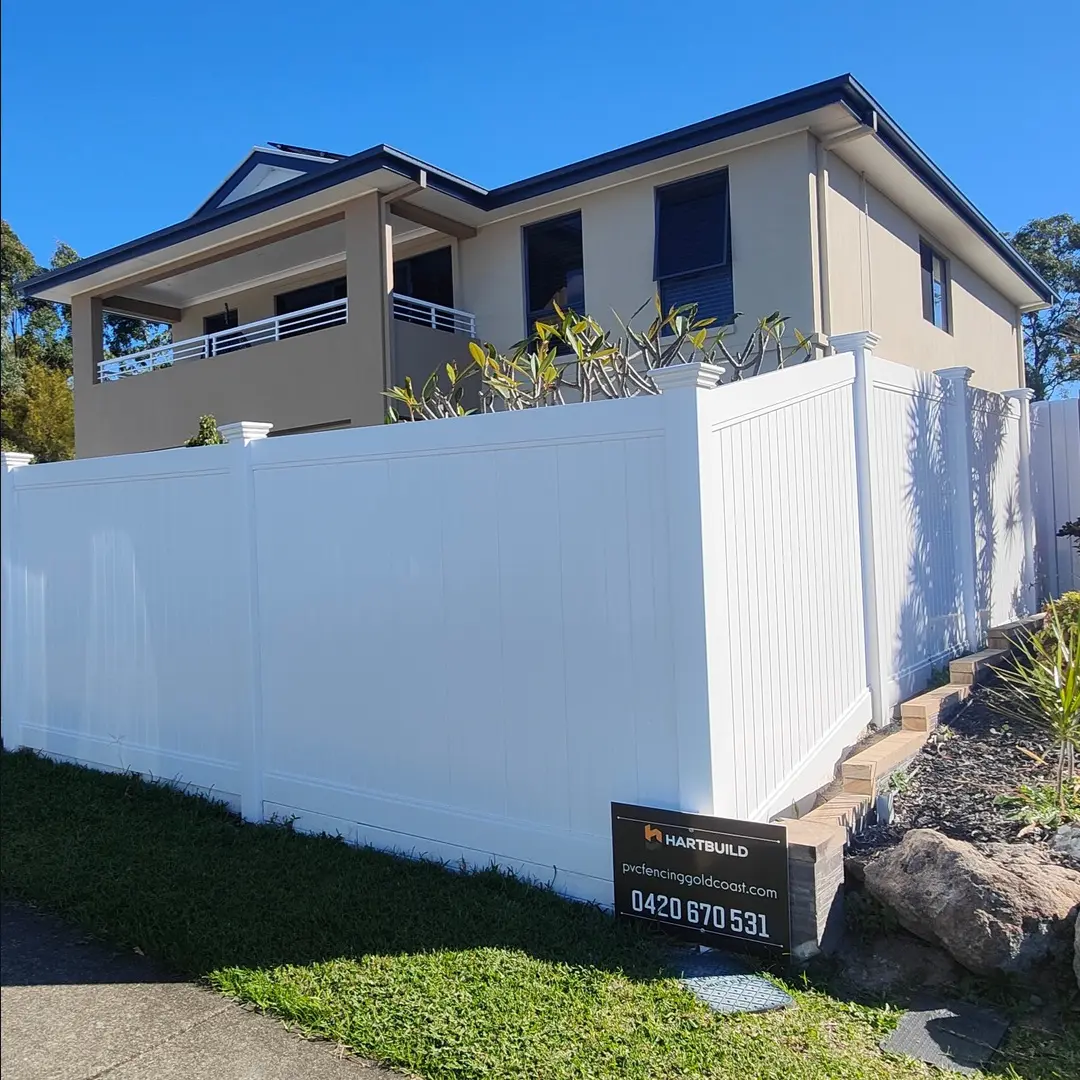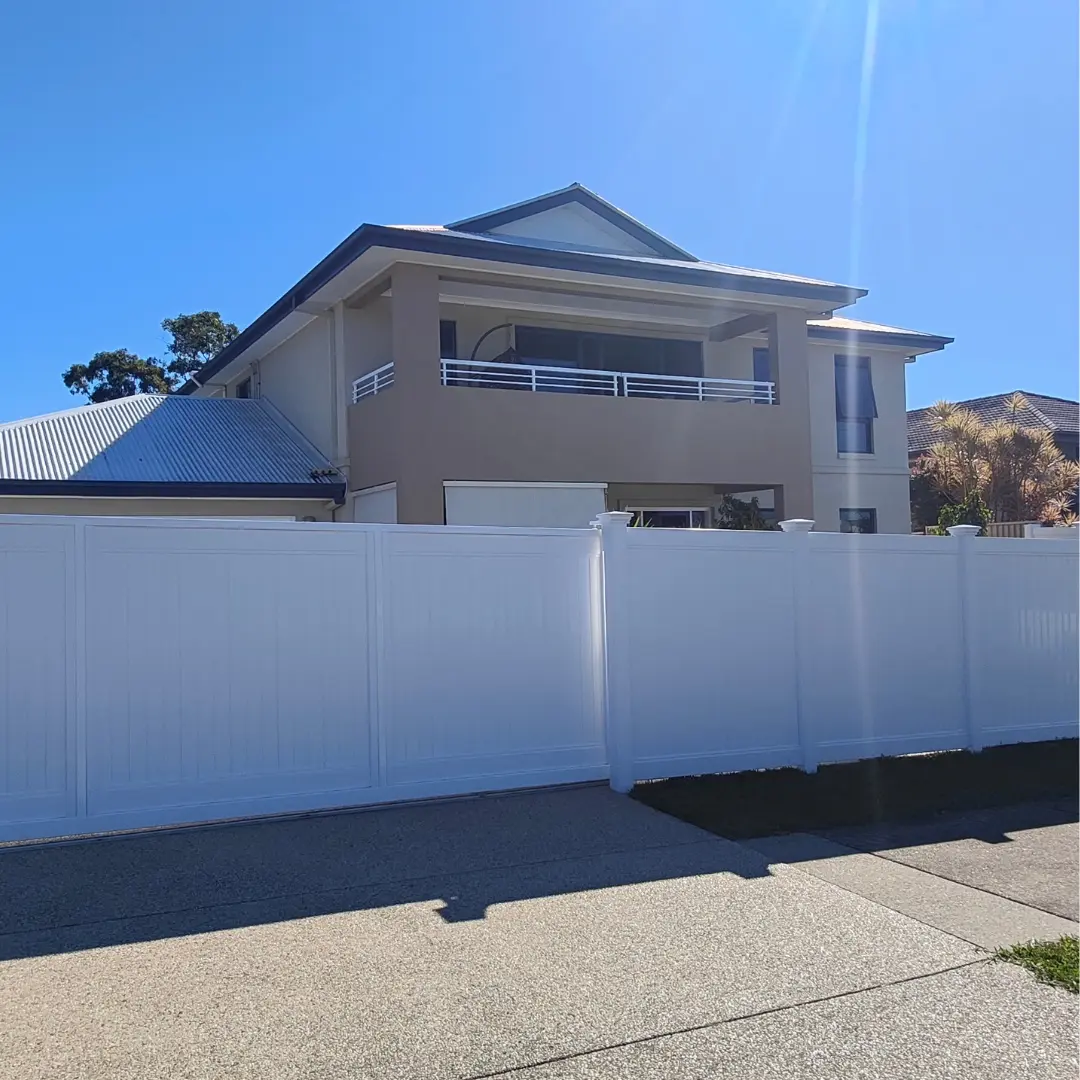What are the Advantages of PVC Fencing in Australian Coastal Areas? PVC fencing offers exceptional advantages for coastal properties in Australia, providing unparalleled durability, resistance to salt spray, and protection against intense UV radiation. These features make PVC fencing an excellent choice for environments that experience harsh weather and challenging climates.
At Hartbuild PVC Fencing, we understand the needs of coastal property owners. With years of experience in Queensland and nearby areas, our experts provide high-quality PVC fencing solutions. We offer various styles and designs of fencing solutions for your property for both homes and businesses, ensuring your property fencing is both functional and attractive.
In this article, we will discuss the benefits of PVC fencing in coastal areas. We will compare its cost to traditional materials and explain why many property owners along Australia’s coast choose PVC fencing.
Overview of PVC Fencing
PVC (polyvinyl chloride) or simply vinyl fence is a low-maintenance best fencing option gaining popularity for residential and commercial properties. It is valued for its strength, weather resistance, and easy installation, making it a preferred choice for Australians in coastal areas.
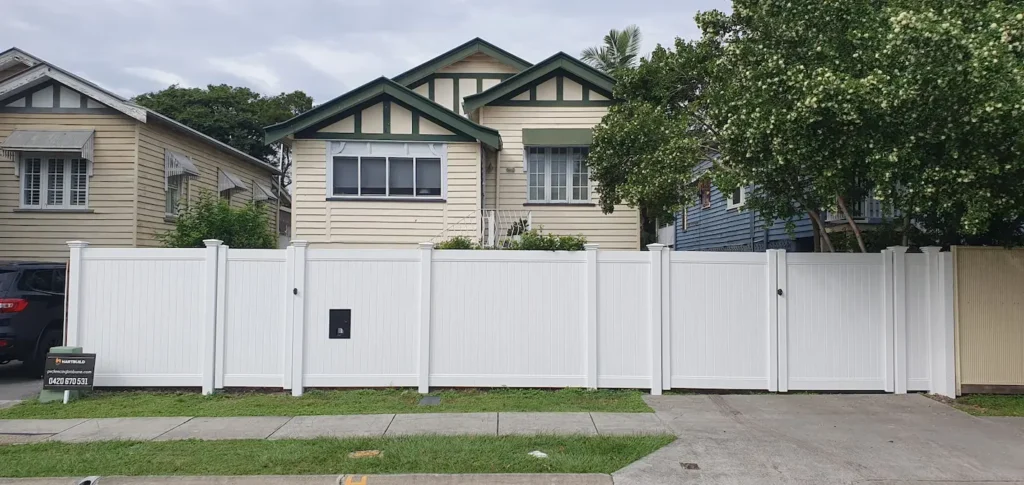
Why Is PVC Fencing the Best Choice for Coastal Areas?
PVC fencing stands out for its durability and resistance, outperforming traditional timber fences and the colorbond fences. Made from polyvinyl chloride, PVC fence panels are specifically designed to resist corrosion, withstand harsh sunlight, and endure salt spray, making them an ideal option for coastal environments.
Australian homeowners choose PVC fences for their cost-effectiveness and longevity. These fences maintain their appearance for years, even under constant exposure to UV rays, without fading or showing signs of deterioration.
Coastal Challenges for PVC Fencing
Coastal environments pose significant challenges that can degrade material like traditional fencing. Selecting the right fencing material is critical for long-lasting performance.
1. Salt and Moisture Exposure
Salt and moisture in coastal areas create a corrosive environment. Salt spray settles on surfaces, speeding up metal corrosion and wood decay. PVC fencing resists these effects by offering:
- Salt corrosion resistance: No rust or decay from salt exposure.
- Non-porous surface: Prevents moisture penetration.
- Durability in humidity: Maintains strength in high-moisture conditions.
2. Wind, Sand, and Debris
Coastal winds carry abrasive sand and debris, causing wear on conventional fences. PVC fencing counters these effects with:
- Flexible strength: Adapts to impact without damage.
- Erosion resistance: Stands up to sand-driven abrasion.
- Wind resilience: Handles high wind pressure without structural failure.
3. UV Rays Challenges
Coastal regions in Australia face intense ultraviolet radiation, which can weaken many materials. PVC fencing, including white PVC options, offers reliable protection against these challenges:
- Fading: Retains colour and appearance.
- Brittleness: Resists cracking due to its UV resistant composition.
- Structural damage: Maintains integrity under prolonged sunlight exposure.
Key Advantages of PVC Fencing in Coastal Areas
1. Durability and Corrosion Resistance
PVC fencing provides excellent durability in coastal environments. It is also resistant to salt corrosion completely, prevents moisture damage, and maintains structural integrity even during extreme weather conditions.
2. Low Maintenance
This fencing material requires minimal maintenance. It eliminates the need for painting or staining, is easy to clean with soap and water, and resists pests, rot, and rust effectively.
3. Long-Term Cost Savings
PVC fencing proves cost-effective in the long run. While the initial investment may be higher, the significantly reduced maintenance costs, extended lifespan, and elimination of frequent replacement expenses make it a financially sound choice.
4. Aesthetic Options
PVC fencing offers diverse design possibilities. With multiple colour choices, various style configurations, and the ability to complement different architectural designs, it enhances the appearance of any property.
5. UV and Weather Resistance
PVC fencing incorporates advanced UV-resistant technology. This ensures consistent colour retention, prevents material degradation, and provides reliable protection against harsh environmental conditions.
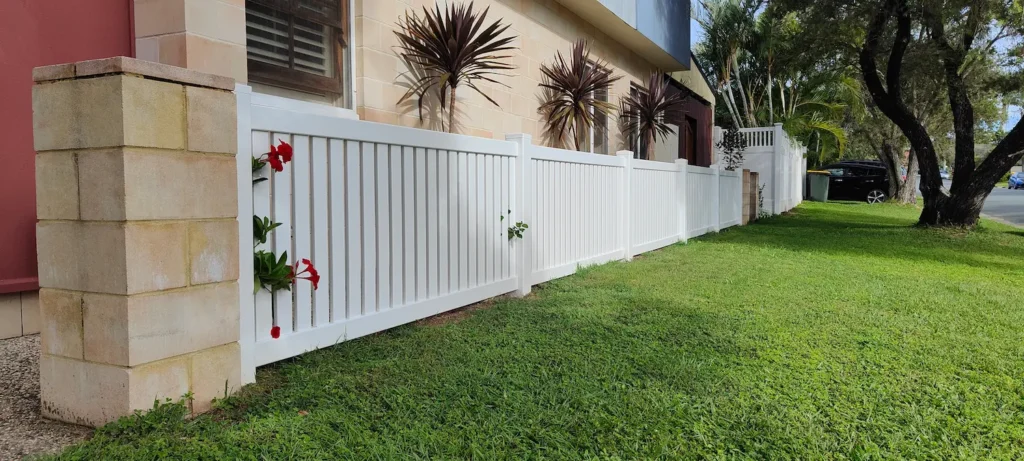
Popular PVC Fencing Styles for Coastal Properties
Privacy Fences
Privacy fences use solid panel designs to provide full privacy and wind protection. These fences are ideal for creating quiet and secluded outdoor spaces.
Picket Fences
Picket fences offer a classic coastal look that complements both traditional and modern architectural styles. They combine decorative appeal with functional benefits.
Post-and-Rail Fences
Post-and-rail fences are excellent for marking property boundaries. They maintain an open and airy feel, fitting the open landscapes typical of coastal areas.
Custom and Decorative Panels
Custom and decorative panels allow property owners to add a personal touch to their fencing. These designs enhance the appearance of the property while maintaining the durability and performance of PVC.
Comparing Costs
Here is a cost comparison with traditional fencing options:
| Fencing Type | Initial Cost | Maintenance Cost (10 years) | Replacement Frequency |
|---|---|---|---|
| PVC | Higher | Very Low | 20-30 years |
| Wood | Lower | High | 7-10 years |
| Metal | Medium | Medium | 15-20 years |
Although PVC fencing has a higher initial upfront cost, but its long lifespan and minimal maintenance make it a low-cost option over time, particularly for coastal properties.
Environmental Benefits
PVC fencing offers several eco-friendly advantages:
- Recyclability: Many PVC fences are made from recycled materials and can be recycled at the end of their life, reducing landfill waste.
- Longevity: PVC’s durability minimizes the need for frequent replacements, saving resources over time.
- No Harmful Treatments: Unlike wood fences, PVC fencing does not require chemical treatments, preventing harmful substances from entering the environment.
Installation Tips for Coastal PVC Fencing
Proper installation is essential to ensure PVC fencing performs well in coastal environments.
- Set Posts Deeper: Coastal soils, especially sandy ones, require deeper post placement to maintain fence stability.
- Use Corrosion-Resistant Hardware: Stainless steel or similar corrosion-resistant fixings prevent rust and keep the fence looking clean.
- Account for Expansion: PVC expands and contracts with temperature changes. Leave small gaps between panels to allow for this movement.
- Consider Professional Installation: Hiring professionals ensures the fence is correctly installed to handle coastal conditions for years.
Maintenance Tips for Longevity
PVC fencing requires minimal upkeep, but regular care can extend its lifespan and keep it in top condition.
- Clean Regularly: Rinse the fence with water every few months to remove dirt and prevent salt build-up.
- Inspect for Damage: Check for loose fittings or damage from debris, especially after storms.
- Use Mild Cleaners: Clean the fence with mild soap and water to protect its finish. Avoid harsh chemicals that may cause damage.
Choosing the Right PVC Fence for Your Coastal Property
Selecting the right PVC fence for a coastal property requires careful consideration of key factors.
- Wind Ratings: Choose a fence that meets local wind load requirements to ensure durability in coastal conditions.
- Material Quality: Opt for PVC fencing designed for coastal environments to withstand salt, moisture, and ultra-vialot exposure.
- Warranty Coverage: Select a product with a strong warranty to safeguard your investment and provide long-term assurance.
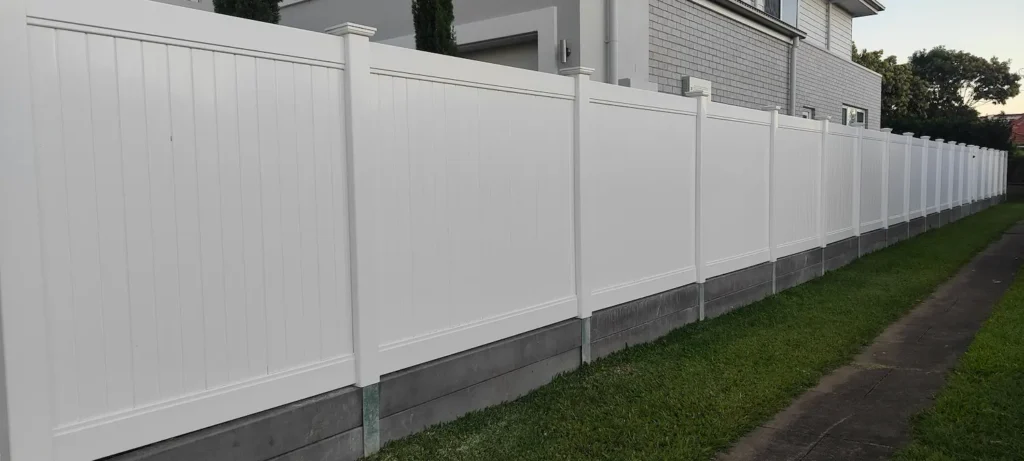
Conclusion
PVC fencing provides exceptional benefits for properties in Australia’s coastal areas. It offers durability, low maintenance, and aesthetic appeal, making it an excellent choice for homeowners and businesses. Choosing PVC fencing means investing in a long-lasting, cost-effective solution that withstands coastal challenges while enhancing your property’s appearance.
Upgrade your coastal property with a durable and stylish PVC fence. Contact Hartbuild PVC Fencing today for a free consultation. Our team is ready to help you find the right PVC fencing solution for your needs.
People Also Ask
How does PVC fencing hold up in Australia’s coastal environment?
PVC fencing performs well in coastal areas due to its resistance to salt, moisture, and UV radiation. It does not corrode, rot, or fade like wood or metal, making it suitable for beachside properties.
What are the maintenance requirements for PVC fencing in coastal areas
PVC fencing requires minimal upkeep. Unlike wood fences that need regular painting or staining, PVC fences only need occasional cleaning with soap and water. This simplicity saves time and money over its lifespan.
Is PVC fencing cost-effective for coastal properties?
Although PVC fencing has a higher initial cost, its durability and low maintenance make it cost-effective in the long term. It requires fewer repairs and replacements, resulting in significant savings over time.
How does PVC fencing compare to other materials for coastal use?
PVC fencing is more durable than wood or metal in coastal conditions. It resists rot, rust, and insect damage, and it is unaffected by salt spray and moisture, making it a better choice for beachside properties.
Is PVC fencing environmentally friendly?
Modern PVC fencing uses recyclable materials and has a long lifespan that can last for years. It does not require chemical treatments like wood, reducing environmental impact. Its durability also minimises replacements, lowering its overall carbon footprint.

